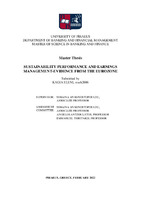Sustainability performance and earnings management - Evidence from the eurozone

Master Thesis
Συγγραφέας
Καγιά, Ελένη
Kagia, Eleni
Ημερομηνία
2022-02Προβολή/
Λέξεις κλειδιά
Corporate Sustainability Performance ; Corporate Social Responsibility (CSR) ; Financial reporting quality ; Accrual-based earnings management ; Accruals quality ; Real earnings managementΠερίληψη
Η παρούσα διπλωματική εργασία εξετάζει την επίδραση της Επίδοσης της Εταιρικής Αειφορίας (Corporate Sustainability Performance) στη χειραγώγηση κερδών των εταιριών, στο επίπεδο της Ευρωζώνης. Κίνητρο της έρευνάς μας αποτελεί η τάση των εταιριών τα τελευταία 30 χρόνια να ενσωματώνουν και να προωθούν τις Αρχές της Εταιρικής Κοινωνικής Ευθύνης (ΕΚΕ) (Ioannou & Serafeim, 2015), καθώς και οι λόγοι που την υποκινούν. Βασιζόμενοι σε προηγούμενη έρευνα, εξετάζουμε αν η υιοθέτηση πρακτικών που ενισχύουν την αειφόρο ανάπτυξη, συμβάλλει στη διαφάνεια και την ενισχυμένη λογοδοσία των εταιριών ή εξυπηρετεί ωφελιμιστικούς σκοπούς της Διοίκησης.
Για την κατασκευή του μοντέλου μας , όσον αφορά στη μέτρηση της χειραγώγησης των κερδών, χρησιμοποιούμε τρείς μεθόδους, καθώς και παραλλαγές αυτών: μέθοδος χειραγώγησης κερδών με βάση τα λογιστικά δεδουλευμένα με τα μοντέλα των Jones (1991), Dechow et al. (1995) και Kothari et al. (2005), μέθοδος μέτρησης της ποιότητας των κερδών μέσω της απευθείας μέτρησης της ποιότητας των λογιστικών δεδουλευμένων σύμφωνα με τα μοντέλα των Dechow and Dichev (2002) και McNichols (2002), και τέλος, μέθοδος χειραγώγησης κερδών με βάση τις πραγματικές λειτουργικές επιλογές με το μοντέλο του Roychowdhury (2006). Για τη μέτρηση της Επίδοσης Εταιρικής Αειφορίας λαμβάνουμε υπόψη την κοινωνική και περιβαλλοντική διάσταση της εταιρίας και την ορίζουμε στη βάση σχετικής βιβλιογραφίας (Hummel & Ising, 2015; Lys et al., 2015; Manning et al., 2019). Παράλληλα, παραμετροποιούμε το μοντέλο μας εισάγοντας μεταβλητές που έχει αποδειχθεί ότι επιδρούν στην επίδοση της εταιρίας καθώς και μεταβλητές που συσχετίζονται με ζητήματα της εταιρικής αειφορίας. Τα ευρήματά μας είναι ισχυρά και υποδεικνύουν ότι η Επίδοση της Εταιρικής Αειφορίας είναι αρνητικά και στατιστικά σημαντικά συνδεδεμένη με τη χειραγώγηση των κερδών, μετρημένη και με τις τρεις μεθόδους. Το γεγονός αυτό καταδεικνύει ότι η έμφαση στη βιώσιμη ανάπτυξη από τις εταιρίες συνοδεύεται από ενισχυμένη διαφάνεια, λογοδοσία απέναντι στα ενδιαφερόμενα μέρη και αξιοπιστία της δημόσιας λογιστικής πληροφόρησης.
Για τη διεξαγωγή της εμπειρικής έρευνας χρησιμοποιήθηκε ένα δείγμα 3.090 εισηγμένων εταιριών που ανήκουν σε χώρες της Ευρωζώνης και ακολουθούν τα πρότυπα IFRS τουλάχιστον για μία χρονιά την χρονική περίοδο από το 2005 έως και το 2020. Από αυτό το δείγμα προέκυψαν συνολικά 32.214 παρατηρήσεις. Τα δεδομένα αντλήθηκαν από τις Βάσεις Δεδομένων Worldscope (λογιστικά στοιχεία) και Datastream και ESG Refinitiv (στοιχεία πάνω σε εταιρική αειφορία).


